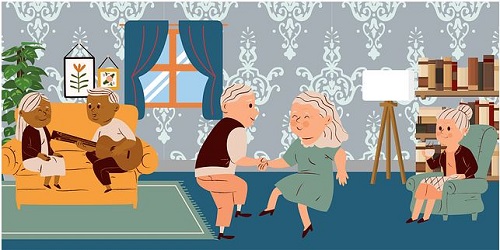Life Rights - Part One in a series of 'Life Rights' articles written by Prof Graham Paddock
UNDERSTANDING LIFE RIGHTS: The Basics
Article by Graham Paddock
While South Africa does still have many homes that include three generations of families, with increased life spans and 'health spans' an increasing number of persons over 50 years of age are choosing to live in specialised retirement developments that provide them with more than just housing accommodation. They also provide meals, medical care, exercise facilities in a managed health and welfare package wrapped in a supportive social environment.

The Housing Development Schemes for Retired Persons Act 65 of 1988 ('the Act') exists to provide retirees with housing consumer protection. It does this first by regulating the contracts by which retirees acquire 'housing interests' in 'housing development schemes’, being those reserved for persons older than 50 years (‘retirees’), and secondly by ensuring that retirement schemes are funded and managed in a way that protects retirees' investments and gives them control of the body that administers the retirement scheme.
A housing interest can be any type of right either to claim transfer of land or to use and occupy land in a housing development scheme. From a management perspective, the Act divides all housing development schemes into three separate categories, being those where the retirees:
- take transfer of sectional title units and are members of a sectional title body corporate which manages the scheme;
- hold shares in and have a use agreement with a share block company that owns or leases the land and manages the scheme;
- do not own units or hold shares in a share block company, but have some other form of rights, often called 'life rights', in which case the Act provides for the automatic establishment of a management association to manage the scheme and sets out specific provisions that are and must be included in its governance documents.
In all three types of retirement scheme, the Act obliges a developer to:
• make extensive disclosures to retirees who invest in the housing development scheme,
• call a meeting of the management body within a short period, and
• turn over the management of the scheme to the management body.
In addition, the developer's voting power and financial responsibilities reduce as retirees take up the housing interests, to the point where the developer has no voting rights or financial obligations except to the extent that it retains or re-acquires housing interests.
The processes of managing sectional title and share block schemes are reasonably well understood, but the terms of the management of life right schemes and other forms of housing development schemes where the retirees do not own a unit or hold shares in a share block company, set out in in regulations 6 to 12, 14, and 15 of the Act, are not well known.
Every life right agreement has its own particular terms, but they all give retirees the exclusive right to occupy some specified accommodation, along with the shared right to occupy and use the common property in the development in consideration for a long-term loan, monthly levy payments and a range of service charges. These contractual rights exist between the developer or subsequent owner of the land units and the life right holders, typically spouses or partners, and lasts for their lifetimes unless it is terminated earlier.
Under the terms of a life right agreement with the developer, retirees give the landowner an interest-free loan, repayable in full or in part on termination or, more usually, when a new beneficiary takes over the housing interest. The loan is interest-free—the life right holder gets the use of the dwelling and common property, but no interest or capital appreciation. The developer gives up all occupation and use rights, reducing its effective ownership rights to selling the property subject to the life right. On the other hand, the life right holder agrees to pay a monthly levy to cover a share of the costs of maintaining the dwellings in the development and the costs of the scheme's management and administration, and usually also other specified charges such as rates and taxes levied on the dwelling. Life rights agreements often require beneficiaries to pay for meals, emergency medical services, internet connectivity, telephone services, and the costs of a range of other utilities, services and facilities associated with the retirement scheme. The Act was amended 1990 to give retirees increased protection for their occupation rights which now rank with those of long-term registered lessees.
In addition, a life right retiree has statutory rights and obligations in terms of the Act as an automatic member of the life right management body and in terms of its governance documents and rules. The governance documents, often the constitution and rules of a voluntary association, must incorporate the provisions of regulations 6 to 12, 14, and 15 of the Act. These deal with: 6. Appointment of a managing agent; 7. Establishment of a management association; 8. Duties of management association; 9. Powers of management association; 10. First meeting of the association; 11. Management agreement rights vesting in the association, and 12. Association’s annual budget of income and expenditure.
In forthcoming editions of Paddocks Press we will unpack the provisions of regulations 6 to 12, 14, and 15 of the Act and discuss some challenges that face retirees in life right schemes.
Courtesy: Graham Paddock

Graham Paddock is a specialist community schemes attorney, notary and conveyancer. He has been advising clients and teaching students for over 40 years, and was an adjunct professor at UCT for 10 years.
Article reference: Paddocks Press: Volume 18, Issue 17.
This article is published under the Creative Commons Attribution license.






